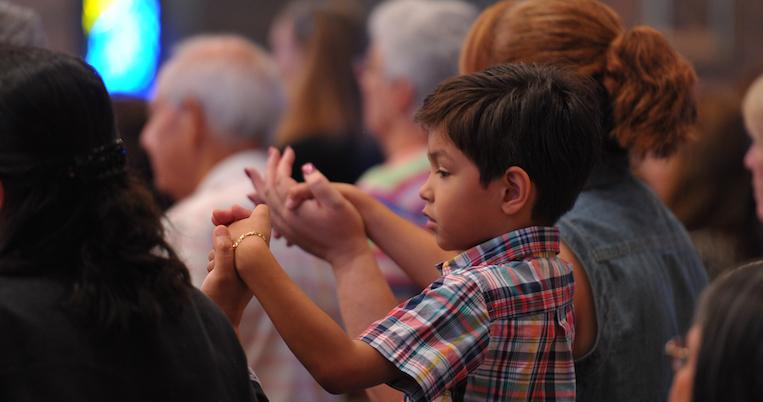The Wichita Diocese's St. Katharine Drexel Catholic School Fund, established to help financially struggling parishes keep both inner-city and rural Catholic schools serving students from all backgrounds, has doubled last year's receipts and reached its financial goal of $1 million in 2015.
That's a boon for parishes, families, and at-risk children, and diocesan schools superintendent Bob Voboril interprets it as an advance enabled by deeply rooted commitments among Wichita Catholics. He distinguishes between the St. Drexel Fund and the benefactor-driven funds aiding disadvantaged students in some other dioceses. It reflects, he says, the solidarity and mission spirit of Wichita's special "stewardship way of life."
A key difference in the diocese's newly expanded fund is its targeting: The financial assistance goes to parishes, not schools or individual students. This innovative model affirms the diocese-wide tradition of parish-paid Catholic school enrollments. The tradition has its roots in one parish's trial run in 1968, and it has spread to all elementary and secondary schools, thanks to a succession of bishops, pastors, and parishioners contributing sizable portions of their income.
"The spirituality of stewardship engages people to recognize that everything they have is a gift from God to be shared," Voboril says. Over time, diocesan and parish practices—plus teachings of charity and trust in providence—led Wichita Catholics to embrace each parish as a central resource bringing faith to life and forming young people in that faith.
Generous laypeople fostered a parish's pledge to pay the Catholic school tuition as an investment in its children, Voboril says. In 1985, the Most Rev. Eugene Gerber committed the Diocese of Wichita to stewardship as a spirituality that would drive diocesan priorities and decision-making. Bishop Gerber gave parishes a choice whether or not to fund Catholic education as a parish mission. By 2002, every pastor in the diocese saw the adjacent school as a ministry.
Voboril, as superintendent of schools since 1993, has seen the parishes sustain their stewardship of schools. He has spoken around the country about the path Wichita has chosen. The Most Rev. Carl Kemme, who became Bishop of Wichita a year ago, has joined his predecessors in supporting that path.
"The parishes recognize the extraordinary value of a Catholic school," Voboril says. Now, about 70 percent of the diocese's school-age children attend Catholic school, in contrast to a national average closer to 15 percent. Voboril says his own parish, for example, funds 700 Catholic elementary school students and 300 Catholic secondary school students.
A sense of dynamic parish life has yielded important benefits beyond the financial ones, Voboril says. The mid-sized diocese currently has sixty seminarians and supports such major charitable institutions as a growing nightly food ministry for the city's homeless and a free medical clinic for the working poor. Many churches offer Eucharistic adoration. In education, a diocesan special-needs ministry and the tripling of Hispanic student enrollments are making school communities more inclusive.
These parish communities also pursue justice among all participants, with pastoral staffs and parishioners sharing responsibility. Catholics express their faithful stewardship by attending Sunday Mass—at levels far above the national average—and by joining in sacramental and organizational activities, Voboril says. Parish leaders have moral authority when they highlight the gifts that flow among the people in the pews—and when they encourage all to be accountable in a variety of ways. These include adult involvement in parish ministry and good behavior among the students.
Overall, a spirit of generosity has bubbled up among Wichita Catholics over the decades. Voboril says that's the crucial context for the design and success of the St. Katharine Drexel Catholic School Fund, established in 2005 and now allowing the generosity of people across the diocese to bubble over.
"It takes the stewardship model beyond parish boundaries," Voboril says. The Drexel Fund money goes to the cash-strapped parishes where engagement is strong but a congregation's resources can't match the high costs of education. In the spirit of shared accountability, parishes must make a substantial gift to support their children's schooling even before the new Drexel dollars are added, and the schools and diocese also have done their part to boost the pool of available assistance to $1 million.
This diocesan response to the recent years of economic and demographic change in center-city Wichita is already bolstering a sense of sustainable hope—and solidarity—among Catholics and non-Catholics alike, Voboril says. Overall enrollment in the high schools—persistently dedicated to a high-quality education for all children—is on the increase, as is the percentage of students from low-income families and under-represented groups: "It's a phenomenal thing to see."
The St. Drexel Fund approach for supporting urban Catholic schools may not succeed everywhere, Voboril acknowledges. But this game-changing outcome from the spirit of stewardship and widespread engagement in parish communities is achievable, he says, and a number of dioceses and schools around the country are emulating it.
"Does it work? Yes, we're living proof, and there's nothing terrifically unusual about Wichita," Voboril says. But he cautions that the St. Drexel Fund's success can't be superimposed on a lukewarm regimen of development campaigns alone.
"It's a way of living your faith," he says. "Stewardship is a remarkable philosophy, but only if parishes decide to commit to the spiritual foundation, instead of going for the quick financial fix."
 Alliance for Catholic Education
Alliance for Catholic Education
